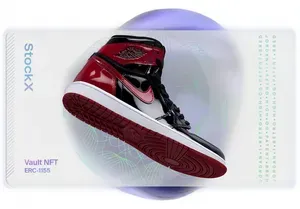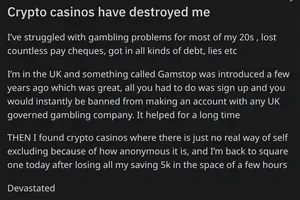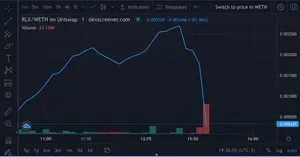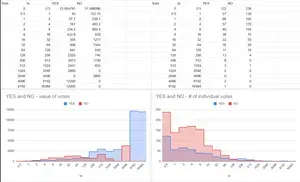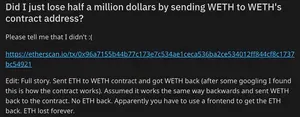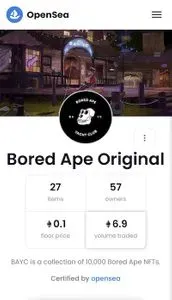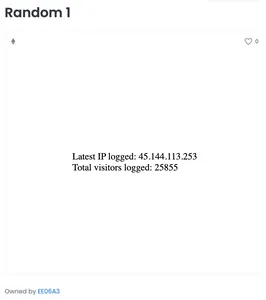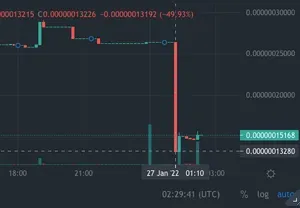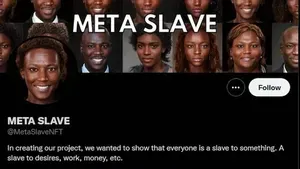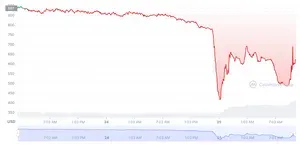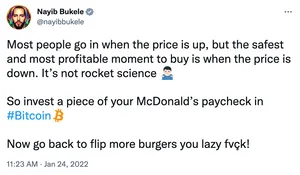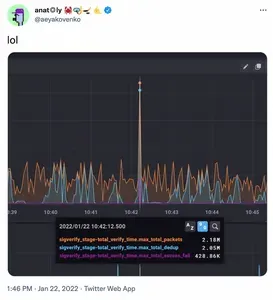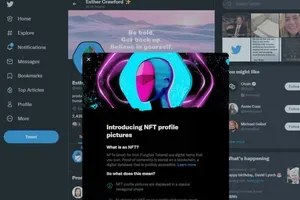This lawsuit is somewhat similar to the January lawsuit by Hermés against artist Mason Rothschild, who has been selling "MetaBirkin" NFTs (though MetaBirkins describes itself as an art project, and promises no physical items).
Nike sues StockX for selling unauthorized NFTs of their shoes
Miami mayor Francis Suarez's MiamiCoin gambit lands the city $5.2 million, investors not so lucky
On February 2, Suarez excitedly announced that they had received their "first-ever disbursement... totaling $5.25M". He didn't mention that the coin is trading at 90% below its all-time-high and 35% less than its initial price of $0.01. Both the OKCoin exchange and the coin creator previously advertised that buyers could earn "430% APY" by participating in some sort of staking program with the coin. All current holders of the coin, such as the Miamians Suarez encouraged to invest, have lost money even when factoring in staking rewards, says Protos.
Wormhole, a cross-blockchain bridge, is hacked for more than $320 million in one of the largest hacks to date
Game studio behind Worms games series does a quick U-turn on their NFT project after massive backlash
HitPiece catches heat for selling song and album NFTs without seeking consent from the artists
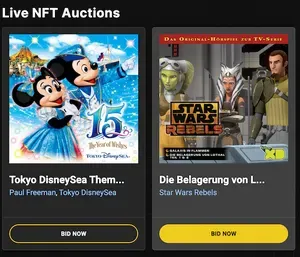 You have to admit they have guts for so prominently listing stolen IP from the notoriously-litigious Disney (attribution)
You have to admit they have guts for so prominently listing stolen IP from the notoriously-litigious Disney (attribution)The project's website writes, "Each time an artist's NFT is purchased or sold, a royalty from each transaction is accounted to the rights holders account." They do not write about how this is supposed to work when the artists have had zero involvement in the NFT being created to begin with, or have no cryptocurrency wallets at all. The FAQ also includes a hilariously handwavy answer to the question most people learning about NFTs have: "What utility does owning an NFT give me?" HitPiece writes, "Artists provide NFT owners access and experiences."
Someone sends COVID-19 NFTs to all ~100,000 active users of the HEN NFT marketplace, whether they want them or not
About 30 posts in a subreddit about gambling addiction mention crypto in the month of January
Regardless of whether they are trying to use blocking software or not, some people in the subreddit appear to be struggling with the challenges presented to them by cryptocurrencies. Some speak about gambling in cryptocurrency casinos, while others have realized that the behaviors that many people involved with cryptocurrencies simply refer to as "investing" are actually manifestations of their gambling addiction. One poster wrote, "Realised yesterday whilst out walking my dog that i'd used crypto as a way to satisfy my gambling urges. I've self excluded from gambling sites for a few years now and managed to taper off. Crypto pulled me back in with trading. I was lying to myself that I was 'investing' so its fine which eventually turned into 24/7 chart watching and leverage trades."
The World Wildlife Fund announces their upcoming NFT project... for nature!
This was not the WWF's first foray into NFTs — the German arm of the WWF released a "Non-Fungible Animals" NFT project in November 2021, which has enjoyed less than $10,000 in trading volume. It also did't appear to be the only project the WWF UK had planned — their NFT website advertised upcoming collaborations with CyberKongz (built on the Ethereum blockchain) and World of Women (also built on the Ethereum blockchain).
Realux, a project promising to "democratize" and "resolve the wealth gap" in real estate, rug pulls $23,000 only hours after launch
After backlash, Troy Baker announces he will no longer be partnering with the "voice NFT" project Voiceverse
All "iloveponzi"'s apes gone! Veteran hacker makes $700,000 stealing and flipping big name NFTs
Tax season begins to hit crypto Reddit hard
Questions like "How can crypto be a viable currency if every transaction is taxed?" are beginning to pop up as well, and more than a few commenters have described their plans to not report any of their crypto activity — certainly a wise thing to be discussing on a public Internet forum.
Streamer Ice Poseidon admits to scamming his followers out of $500,000 with his "Cxcoin" made for streamers
On January 31, 2022, a YouTuber named Coffeezilla released a video in which he confronted Denino about his actions and urged him to return the money to his fans who'd bought in on the project. Denino replied, "I could give the money back, it is within my power, but I am going to look out for myself and not do that." According to Coffeezilla, Denino took a total of $200,000 from the token's presale, $250,000 that was earmarked for marketing, and $300,000 from the liquidity pool. In the end, Denino pocketed around $300,000 and his developers took around $200,000. After realizing that Coffeezilla would be releasing the interview, Denino promised to "use the buyback function to put 155k into the liquidity" — which turned out to mean 155,000 BNB rather than dollars, roughly equivalent to around $40,000.
- "This Famous Livestreamer Stole $500,000 From His Fans", video by Coffeezilla
- Tweet by coffeebreak_YT
Someone starts selling colors on the blockchain, because why the hell not I guess
Qubit continues to try to tempt the attackers who stole $80 million to return it, with increasingly-desperate messages
Wonderland protocol founder writes that the "Wonderland experiment is coming to an end", despite vote ongoing and majority of participants voting to continue
By raw numbers it appeared most investors opposed the idea, as many will receive miniscule amounts compared to their initial investments. However, the larger holders (most of whom bought in at low prices) stand to make money from the liquidation and some have supported winding down. Because the DAO voting operates in a plutocratic model, where people can vote based on how many tokens they hold, at one point votes from a relatively small number of whales were trending the vote towards supporting winding down even though 90% of individuals wanted the project to continue. The votes to continue had begun to beat out the votes to wind down when Daniele Sestagalli announced on Twitter on January 30, before the vote's scheduled end, that the "Wonderland experiment is coming to an end."
Ultimately, Sestagalli ended up respecting the wishes of the community, who decided to continue the project despite having lost 90% of their money, presumably in hopes of regaining some of the losses.
- "Wonderland votes out QuadrigaCX co-founder Sifu and is considering shutting down", The Block
- "Wind down Wonderland, and give the treasury back to its holders?" vote on Snapshot
- "ELI5 - Explain to me like I'm 5" - The consequences of WIP #4" post on r/WonderlandTIME
- "What is really happening with the vote" post on r/WonderlandTIME
- Tweet by danielesesta
Justin Bieber "buys" a Bored Ape for $1.3 million in a deal that is shady in one of two possible ways
Trader loses $510,000 trying to convert funds between two currencies
Transaction history on Etherscan shows they were the 265th person to make this mistake. Most people did so with far smaller amounts of WETH, although another unfortunate trader lost 115 WETH (at the time valued at $360,000) on August 11, 2021. A total of 432 WETH has been irretrievably lost to this contract this way since July 2018 — currently valued at $1.1 million.
Fake Bored Ape project pulls in $17,500 following high-profile endorsement of Bored Apes
Lazy Lion Ape Club rug pulls for 50 ETH ($125,000)
Khan Academy charity auction ends in blatant wash trade, and Khan Academy removing several former employees from alumni Slack channel for raising concerns
The auction ended on January 21, with a winning bid of 77 ETH (nearly $200,000) from ParagonsDAO, plus the promise of another 34 ETH ($87,000) donation from the DAO to Khan Academy. However, ParagonsDAO is a DAO created specifically to "play a key role in Parallel's governance" and "support the creation of an ecosystem for Parallel to thrive". Former Khan Academy employee S. M. Lundberg raised their concerns about the wash trading, and "KA elevat[ing] Parallel on its own channels to a largely underage and under-resourced user base" in the Khan Academy Slack, and was removed from the channel by Khan Academy founder Sal Khan. At least three other former employees were removed from the channel for criticizing the decision to engage with the NFT project, as was an additional person who protested the removal of those raising concerns.
Although the auction ended with more than $250,000 going to Khan Academy, it is likely that Parallel got the better deal here — Khan Academy is an enormous name to have promoting one's project. Sal Khan actively hyped the project in various spaces, including in an appearance on CNBC's Squawk Box.
87% of trades on LooksRare NFT platform reported to be wash trades
Wash trading is also a widespread tactic in the NFT space to artificially inflate the "value" of an NFT. Because it's relatively easy to create a pseudonymous cryptocurrency wallet, users will "sell" NFTs to themselves for large amounts to create the appearance of higher demand, and to try to convince other would-be buyers that the NFT is more valuable.
After OpenSea begins reimbursing users who lost money due to listings they didn't realize were still available, user "opensee_will_refund_ask_them" and others continue to exploit the widespread problem
Padawan DAO loses half its treasury through risky money management
OpenSea announces limits on free NFT minting, then reverses the decision the same day, after revealing that more than 80% of the items created through the feature were plagiarized, fake collections, or spam
Attacker exploits a bug in Qubit Finance allowing them to mint unlimited collateral and drain the platform of $80 million
People begin creating IP-harvesting NFTs to highlight the vulnerabilities in marketplaces and wallets
This is as good a time as any to remind you to use a VPN! Mullvad is a particularly good pick (#NotAnAd).
Following the Wonderland protocol disaster earlier this week, it is revealed that the pseudonymous chief developer has a long history of financial crimes and shady businesses
Wonderland founder Daniele Sestagalli had also been kept in the dark about the identity of his collaborator until finding out about a month ago. He opted to keep this information to himself, and claims it was because he believes in second chances. After the information became public, Sestagalli began a vote on whether Patryn should be replaced.
- Reddit thread on r/defi
- Twitter thread by zachxbt
- Twitter thread by Daniele Sestagalli
- "Stament[sic] on last Wonderland developments" by Daniele Sestagalli
- "QuadrigaCX cofounder Michael Patryn resurfaces— as 0xSifu, treasury manager of Wonderland", Amy Castor
- "Michael Patryn of QuadrigaCX is back — as 0xSifu from DeFi protocol Wonderland", David Gerard
Melania Trump apparently wash trades her own NFT
Creators of the play-to-earn game "Mercenary" rug pull for more than $760,000
New Zealand auction house Webb's invites buyers of historic glass negative and associated NFT to "make it permanently digital" by smashing the plate after they buy it
Sports fans face losses as IQONIQ platform liquidates and token value plummets
"Let's Go Brandon" coin suddenly drops 50% in value
WeGro token plunges in value as its developer apparently drains 1,000 BNB ($378,000)
"MetaSlave" project tries to sell NFTs of Black people
Investors suffer enormous losses as "cascading liquidations" tank the Wonderland protocol token price below its supposed intrinsic value
The $TIME tokens are issued against a set of assets that supposedly give the token an intrinsic value, and if the price drops below the backing price, the protocol uses the assets in their treasury to buy back the token to bring it back up to its "fair value". In the day following the crash, the protocol's founders spent several million dollars in buy-backs, which briefly boosted the token back up to trading at around $600.
The project's team reportedly suffered major liquidation losses themselves, with the founder Daniele Sestagalli losing $15 million and the chief developer "0xSifu" losing $1.6 million. Sestagalli briefly caused panic in the community when he set his 300,000+ follower Twitter account to private after tweeting "Dude I just woke up losing 10 m dollars", but set the account back to public shortly after. He retweeted a thread stating that "the internal struggle for growth is cut short by the willingness of some entities to 'eat' all that they'r able to, instead of 'cultivating' and sharing what would be exponential profits in the future."
Promised NFT game "Blockverse" rug pulls 500 ETH ($1.2 million)
John Lennon's son is delighted to be able to "auction off" items from his private Beatles collection without actually, you know, selling anything
Lennon said, "I've been collecting these personal items for about 30 years, and I was getting a bit fed up with them being locked away in a vault, where I've had to keep them because I didn't want them to get damaged... I actually felt very bad about keeping all that stuff locked away." Apparently photographing the items and displaying them digitally somehow was not possible until NFTs came along?
"Now go back to flip more burgers you lazy fvçk!" Nayib Bukele continues horrify those who come across his tweets and realize he's not just a Bitcoin bro but the president of an entire country
Naturally, he failed to mention the nearly 1,000 Bitcoin that he had purchased with taxpayer money since September 2021 at times that Bitcoin was above $50,000.
OpenSea users lose a collective $1.8 million to an issue allowing people to buy NFTs at low prices from old OpenSea listings the sellers thought they'd deleted
A software engineer investigating the incident attributed it to OpenSea's choice to do many of their operations off-chain to save on the expensive gas fees required for any Ethereum blockchain transaction, saying this introduced a disparity where updates were not reflected on-chain. Another person investigating the apparent issue reported that this looked to be the same "glitch" as earlier this month, where users tried to avoid paying the gas fees to delist their NFT sales by swapping them out of their wallet and back again, not realizing the listing would still be active when the NFT was returned.
OpenSea added an "Inactive listings" page to allow people to view listings that are still associated with NFTs that have been transferred out of the wallet, though the feature doesn't seem to have been widely publicized and it's not clear when it was released. They also later reimbursed users who suffered losses from this exploit, to the tune of about $1.8 million.
Solfire Finance rug pulls for $4.8 million
However, on January 23, the project developers drained around $4.8 million from the project before deleting the project's website and social media accounts.

